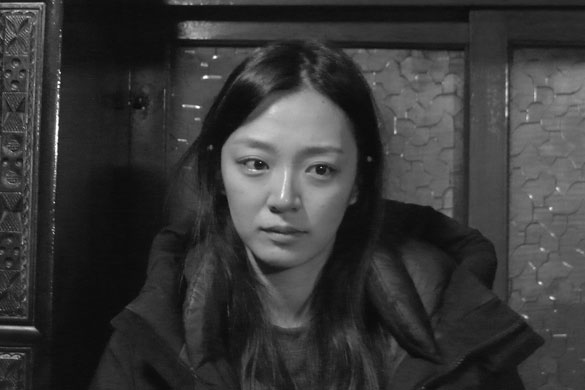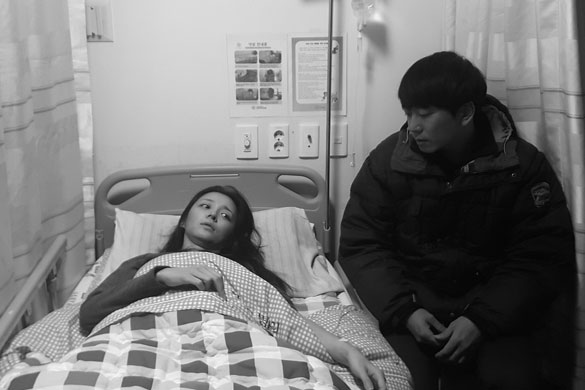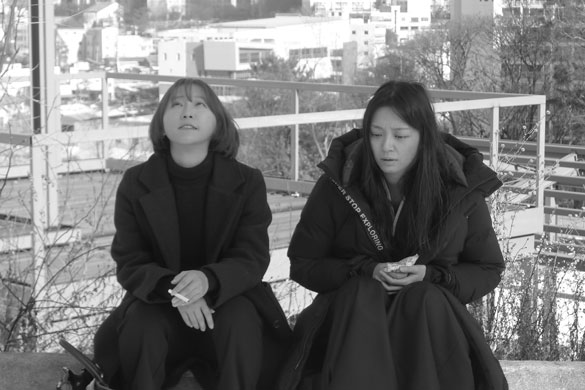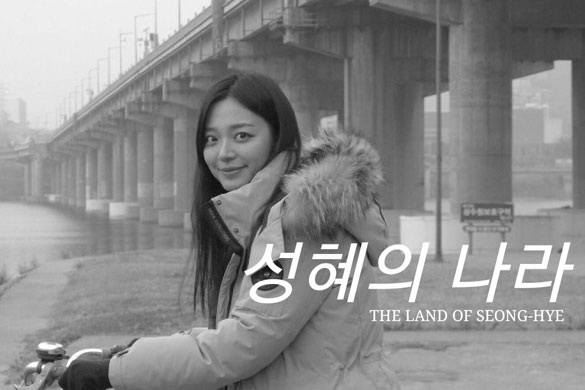
 |
||||
29-year-old Seong-hye's (Song Ji-in) life is a daily struggle to make ends meet. Since quitting her position as an intern at a large company a number of years ago as a result of a shocking incident, she has had little option but to take on numerous menial part-time jobs from morning to night not just to keep the wolf from her own door but to pay her father's monthly hospital bills in the wake of his stroke too, all the while studying at a job centre to try to improve her chances of job interview success.
Review: Right out of the gate I am aware how deeply and darkly angst-ridden the above synopsis makes The Land of Seong-hye sound but while that certainly has become true by around three-quarters of the way through the running time, the annoyances, struggles and bleak occurrences Seong-hye faces are incremental over time, appearing as weight upon weight placed on her shoulders rather than a full-on bludgeoning of her spirit, even though that is ultimately the case. The time taken in ever so gradually stripping Seong-hye of her desperately clung to hope also guarantees viewers will truly feel for her as her situation worsens and want a change for the better for her as much as she yearns for one herself. The showing of the (seeming) increasing hopelessness of Seong-hye’s life is also entirely necessary to give realistic motive to her character arc as a whole and to both underline the film's major theme with copious societal critique and social commentary and indeed allow the narrative to become believably and beautifully uplifting in its conclusion. Considering what you've just read, it may come as rather a surprise to hear me describe The Land of Seong-hye as ultimately uplifting and indeed life-affirming, but the fact that it is (and successfully so) in the wake of such focused-on adversity is a testament to the film's overall strength. The Land of Seong-hye opens with a park scene set in the dead of winter, thick snow in patches covering the icy ground. Seong-hye sits on a bench apparently watching life unfold around her as various members of the public make use of municipal exercise machines. However, in hindsight or on second watch the truth of the matter becomes blatantly clear. For once we become aware that our heroine’s work/life balance is almost entirely work, we realise that rather than watching life in motion Seong-hye is in fact watching life pass her by, her seat on the bench at the very edge of proceedings underlining how separated she is from it, a viewer of life rather than a participant – this idea being further referenced as the narrative progresses with Seong-hye seated outside her work, shops or on the street. Not only that, but director Jung Hyung-suk’s decisions to set the film in the months of winter and film solely in black and white combine with the story itself to further accent the fact that Seong-hye’s existence has no colour; rather being grey within a world wholly cold.
Considering the nature of the story and the fact that this is a Korean film, you could be forgiven for assuming that melodrama at some stage will play a significant part. However, while melodramatic moments do occur they are largely muted (another of the film's many strengths). On hearing bad news or having to mentally process something else that's gone wrong in her life, Seong-hye is repeatedly shown sitting silently, staring at nothing in particular with only a long, exasperated sigh pointing to the feelings she keeps so well hidden (an utterly exemplary and nuanced performance by Song Ji-in as the titular character adding greatly to this and the film's strength throughout), and as such when she is eventually pushed to let her control slip it is absolutely earned to the nth degree - yelling that she's “pi*sed off" when a bunch of kids leave an absolute mess of food and drink in the store where's she's working; when the moped she uses to deliver newspapers breaks down, leaving her having to push it up inclining streets; or when some terrible news finally causes her to fall apart emotionally - while never appearing as heavy handed or melodrama for melodrama’s sake in any respect. It is wholly significant that the first time we see Seong-hye smiling is at the 1h 35m mark (within a two-hour film) but to say any more would, I fear, detract from The Land of Seong-hye’s sheer power as societal critique.
In spite of screening at the 2018 Jeonju International Film Festival and (later) at the London Korean Film Festival 2018 – winning the Korean Competition Grand Prize at the former – The Land of Seong-hye has been shown domestically only once in one Korean cinema on just a single screen, a period so brief that if you'd blinked you'd have missed it. Most people did indeed miss it (and frankly missed out, in the process) with admission numbers barely registering on official box office data. There also appears to be no current plans to screen the film on a broader scale.
The Land of Seong-hye (성혜의나라) / 2018
|
||||
All images © Post Fin, Korean Film Council (KOFIC) Review © Paul Quinn |
||||



